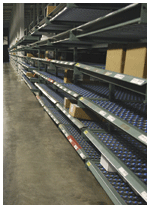RFID’s Biggest Mass-Market Pioneer Continues RFID Trailblazing
12 September, 2006
category: RFID
“Recent internal analysis of our ongoing efforts, along with the launch of EPCglobal Generation 2 tags, reinforces the value of this technology for Wal-Mart, our suppliers and ultimately our customers.”
And so the famous last words of Wal-Mart’s executive VP and CIO Rollin Ford hit the wires, in an announcement centered around the Bentonville, Ark.-based chain’s plans to bring another 500 clubs up to speed with RFID by the end of the year.
That means more than 1,000 Wal-Mart stores will be using the technology (or, nearly one-third of its 3,000-plus U.S. spots).
Giving suppliers more reason to slap, ship, and embrace tags, readers, and high-tech.
Wal-Mart Continues RFID Expansion
More than 1,000 stores and clubs to use technology by end of year
BENTONVILLE, Ark., (Sept. 12, 2006) – Wal-Mart Stores, Inc. (NYSE: WMT) will bring another 500 stores and clubs online with its RFID (radio frequency identification) initiative by the end of this fiscal year, bringing the total number of its retail locations using the technology to more than 1,000. The company has more than 3,900 locations in the United States.
“Recent internal analysis of our ongoing efforts, along with the launch of EPCglobal Generation 2 tags, reinforces the value of this technology for Wal-Mart, our suppliers and ultimately our customers,” said Rollin Ford, executive vice president and chief information officer for Wal-Mart. “We’re aggressively moving forward with the expansion of RFID-enabled facilities.”
The benefits of RFID, especially with regard to reducing out-of-stocks, as well as reducing excess inventory, have been documented in a 2005 study by the University of Arkansas.
Ford noted that all Wal-Mart installations moving forward would only read Gen 2 tags. As the remaining pallets and cases with Gen 1 tags make their way through the distribution network, Wal-Mart will convert all of its systems to only read Gen 2 tags.
“We believe this technology, when coupled with new work processes, will deliver even more benefits than we are currently receiving,” Ford said. “We are actively engaged in designing some new initiatives that will accelerate our program even further and, in so doing, create even more value for everyone involved. We’ll announce those initiatives as we roll them out.”
As predicted by industry experts, the cost of the technology continues to fall while performance continues to improve. Wal-Mart expects this trend to continue as users adopt the Gen 2 tags, which, as envisioned, are becoming the industry’s global standard thanks to significant work by EPCglobal and its members.
Ford said that Wal-Mart continues to work with its next 300 largest suppliers, which are expected to begin shipping test cases in October. These suppliers will go live with their shipments in January 2007, bringing to more than 600 the number of supplier companies using RFID technology in concert with Wal-Mart.
“We continue to work with suppliers to help them see the vast potential of RFID,” said Ford. “We’re already fully convinced of its value and are ready to step up the pace since we know we are only touching the tip of the iceberg when it comes to the benefits of this technology.”
About Wal-Mart
Wal-Mart Stores, Inc. operates Wal-Mart Stores, Supercenters, Neighborhood Markets and SAM’S CLUB locations in the United States. The company also operates in Argentina, Brazil, Canada, China, Costa Rica, El Salvador, Germany, Guatemala, Honduras, Japan, Mexico, Nicaragua, Puerto Rico, South Korea and the United Kingdom. The company’s securities are listed on the New York and Pacific stock exchanges under the symbol WMT. More information about Wal-Mart can be found by visiting www.walmartfacts.com. Online merchandise sales are available at www.walmart.com.


